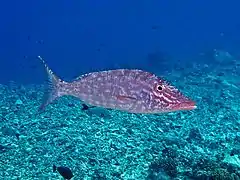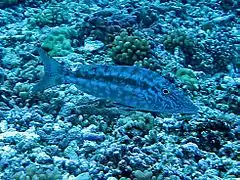Lethrinus olivaceus
Lethrinus olivaceus, common name longface emperor or long-nosed emperor, is a species of bony fishes belonging to the family Lethrinidae.
| Lethrinus olivaceus | |
|---|---|
 | |
| Scientific classification | |
| Domain: | Eukaryota |
| Kingdom: | Animalia |
| Phylum: | Chordata |
| Class: | Actinopterygii |
| Order: | Spariformes |
| Family: | Lethrinidae |
| Genus: | Lethrinus |
| Species: | L. olivaceus |
| Binomial name | |
| Lethrinus olivaceus Valenciennes 1830 | |
| Synonyms[2] | |
|
List
| |
Description

Lethrinus olivaceus can reach a length of about 70–100 centimetres (28–39 in). This large lethrinid has a very long snout, with dark wavy streaks. The basic color of the body is olive-grayish, usually with various irregular darker blotches, but it can have different colour and pattern for a better camouflage. It has 10 dorsal spine, 9 dorsal soft rays, 3 anal spines and 8 anal soft rays. Juveniles show a more forked caudal fin. This species is very similar to Lethrinus microdon.[3][4][5]
Distribution
This species is widespread in Indo-West Pacific, from Red Sea and East Africa to Samoa and Ryukyu Islands.[3][5]

Habitat
It is a reef-associated species and it can be found in lagoons, in sandy coastal areas and in reef slopes, at depths of 1 to 185 m.[4][5]
Biology
These very active and fast swimming fishes often occur in large schools, but adults are usually solitary. They are occasionally found in small schools with Lethrinus microdon.[6] They feed mainly on crustaceans, cephalopods and fishes.[4]
References
- Carpenter, K.E.; Lawrence, A.; Myers, R. (2016). "Lethrinus olivaceus". IUCN Red List of Threatened Species. 2016: e.T16720328A16722400. doi:10.2305/IUCN.UK.2016-3.RLTS.T16720328A16722400.en.
- Biolib
- Carpenter, K.E. and G.R. Allen, 1989. FAO Species Catalogue. Vol. 9. Emperor fishes and large-eye breams of the world (family Lethrinidae). An annotated and illustrated catalogue of lethrinid species known to date. FAO Fish. Synop.
- Lethrinus olivaceus in Fishbase
- WoRMS
- Lethrinus microdon in Fishbase
External links
 Media related to Lethrinus olivaceus at Wikimedia Commons
Media related to Lethrinus olivaceus at Wikimedia Commons- NCBI
- Animal Diversity
- Photos of Lethrinus olivaceus on Sealife Collection
